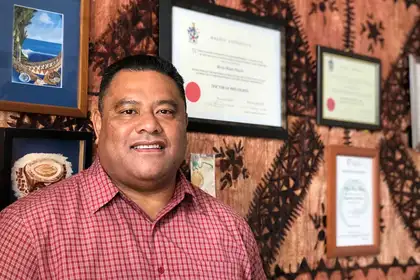
Gisa Dr Moses Faleolo.
As part of his PhD research into Sāmoan youth involved in gangs in South Auckland, Gisa Dr Moses Faleolo discovered a positive and relatively unknown perspective of belonging to a gang –it can help young members to overcome unresolved grief.
Gisa Dr Faleolo, from Massey University’s School of Social Work, spent more than a year listening to the life stories of Sāmoan youth involved in gangs and has been disseminating the key findings in the years since, including those involving unresolved grief.
His thesis, Hard-Hard. Solid! Life Histories of Sāmoans in Bloods Youth Gangs in New Zealand, reveals insights into the lives of four members of Sāmoan youth gangs living in South Auckland, aged between 16 and 24.
Dr Faleolo gained the trust of the young men who opened up to him in 2011 and 2012 about their lives and the circumstances that led them to joining a gang.
“Society typically has preconceived ideas of gang members,” says Gisa Dr Faleolo.
“Most people only hear about gang members’ crimes and criminal activities and judge young people who join gangs. They don’t pay attention to other aspects of their lives, such as what’s led them to join a gang or the consquences they have experienced since.”
He says those he interviewed were dealing with entrenched, deep-rooted personal issues that ranged across mental, social and physical health. While they had received help from doctors, councillors and, in some cases, parents, it didn’t work.
“My research is about exposing elements of these young people’s lives and their attempt to resolve their grief and experiences because they’ve lost all faith in the system, their family and church.
“I wanted to show their resilience and that they are strong, bold young men who, through their own means and solidarity with one another, draw on each other’s strengths to confront and deal with the emotional, social and physical issues they were experiencing.”
The four stories outlined below provide a brief overview into the lives of four interviewees who are referred to by their street names.
- At the age of 12, VDK’s step-mother asked him to get her a glass of water and he became distracted while doing so. He returned to the room to find her collapsed on the floor and she had died of a heart attack. He felt guilty about her death and thought, if he had been there, he could have called for help.
- Another interviewee, Negro, was 18 years old at the time of his interview and had lost two siblings earlier in life. When he was 11, he lost one of his brothers to meningococcal disease in Sāmoa and, six years later, lost another brother to cot death when he was 17 and in charge of the child. His mother had asked him to look after his younger sibling while she went out and he had fallen asleep after smoking marijuana. He woke to find his mum lifting his sibling’s lifeless body from the cot and ambulance staff in the room.
- B-Young wasn’t close to his father and his brothers were in jail, but he had a close relationship with his grandfather on his mother’s side of the family. His grandfather supported him playing rugby and, with a promising future ahead, he urged B-Young to pursue the sport. However, after his grandad’s death, he joined a gang and now feels guilty for not living up to his grandfather’s expectations.
- Syn was eight when his mother and father’s marriage split and, unable to look after her five children, Syn’s mother took him to Sāmoa to live with her sister. She moved to Australia without him, but eventually returned five years later and together they returned to New Zealand when he was 13. Sadly, she passed away from lung cancer just six weeks after they were reunited.
Gisa Dr Faleolo says those he interviewed had found companionship in the gangs.
“They were counselled a lot better than they had been with social services. They were able to share emotions, feelings about the loss of a loved one, witnessing violence, substance abuse. They carried this polyvictimisation [the experience of multiple victimisations such as sexual abuse, physical abuse, bullying and exposure to family violence] into the gangs, but they were then able to unlock their grief.
“The older gang members provided pastoral counselling and moral support.”
He says the four young men were dealing with self-blame, guilt, abandonment and grief. “They had a shared background, cultural understanding and actually gained a sense of belonging by being part of the gang.”
Gisa Dr Faleolo says they were able to find peace, process their grief and some even reconnected with family. “I think the ability to move on gave them a stronger sense of identity, better confidence in who they are, and were therefore more drawn into family support systems.
He says many of the young people he worked with found the interviews therapeutic.